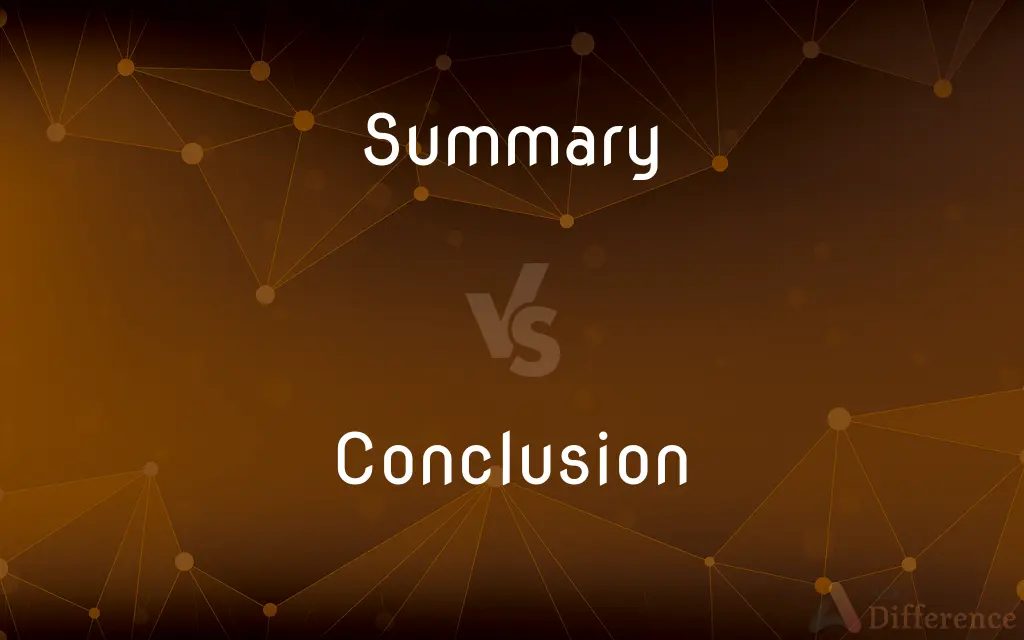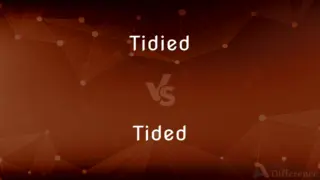Summary vs. Conclusion — What's the Difference?
By Tayyaba Rehman — Updated on September 22, 2023
A Summary provides a brief account of main points, while a Conclusion offers final judgments or implications based on the content.

Difference Between Summary and Conclusion
Table of Contents
ADVERTISEMENT
Key Differences
The terms Summary and Conclusion are integral parts of written content, but they serve different functions. A Summary encapsulates the main ideas or events of a piece, giving a reader a quick overview of the content. Conversely, a Conclusion typically offers a resolution, an opinion, or emphasizes the significance of the information presented.
When reading a book or article, a Summary might condense chapters or sections, highlighting the primary details and events. A Conclusion, however, would often present the author's final thoughts, tying together the preceding content, or suggesting further implications or actions.
In research papers, a Summary might be found in abstracts, offering readers a quick insight into the study. The Conclusion in such papers will elaborate on the findings, implications, and perhaps future research directions. While the Summary remains objective and concise, the Conclusion may contain interpretative content or opinions.
Both Summary and Conclusion are crucial for effective communication. The Summary ensures readers grasp the essential content without delving deep, while the Conclusion offers closure and a deeper understanding of the significance or context.
Comparison Chart
Purpose
Brief account of main points
Final judgments or implications based on content
ADVERTISEMENT
Position in Text
Can be at the beginning or throughout
Typically at the end
Objectivity
More objective, sticking to main points
May contain interpretations, opinions, or suggestions
Length
Usually shorter
Varies; can be brief or more extended depending on the content
Essential Element
Main points or events
Resolution, emphasis, or significance of the content
Compare with Definitions
Summary
A brief account of something.
The teacher gave a Summary of the novel.
Conclusion
The final part or judgment.
The detective's Conclusion surprised everyone.
Summary
A condensed version of content.
The meeting's Summary highlighted key decisions.
Conclusion
A reasoned decision based on evidence.
Her Conclusion was based on months of research.
Summary
An overview of main ideas.
He provided a Summary of the lecture's main themes.
Conclusion
The result or outcome of an act or process.
The experiment's Conclusion supported the hypothesis.
Summary
A succinct representation of details.
The Summary at the article's start was informative.
Conclusion
The end or finish of an event.
The story had an unexpected Conclusion.
Summary
A brief statement mentioning the main points of something
A summary of our findings.
Conclusion
A final decision or judgment.
After hearing all arguments, he reached a Conclusion.
Summary
Prose that provides information in a condensed format, as by mentioning only the most significant details of a narrative
The novelist did not like writing dialogue and preferred to write stories in summary.
Conclusion
The close or last part; the end or finish
The conclusion of the festivities.
Summary
Presenting the substance in a condensed form; concise
A summary review.
Conclusion
The result or outcome of an act or process
What was the conclusion of all these efforts?.
Summary
Performed speedily and without ceremony
Summary justice.
A summary rejection.
Conclusion
A judgment or decision reached after deliberation.
Summary
Concise, brief or presented in a condensed form
A summary review is in the appendix.
Conclusion
A final arrangement or settlement, as of a treaty.
Summary
Performed speedily and without formal ceremony.
They used summary executions to break the resistance of the people.
Conclusion
(Law) The formal closing of a legal complaint or pleading.
Summary
(legal) Performed by skipping the procedures of a standard and fair trial.
Summary justice is bad justice.
Conclusion
A proposition that follows from the premises of a formal proof, for instance from the major and minor premises of a syllogism.
Summary
An abstract or a condensed presentation of the substance of a body of material.
Make a summary of the events
Conclusion
The proposition concluded from one or more premises; a deduction.
Summary
Formed into a sum; summed up; reduced into a narrow compass, or into few words; short; brief; concise; compendious; as, a summary statement of facts.
Conclusion
The end, finish, close or last part of something.
Summary
Hence, rapidly performed; quickly executed; as, a summary process; to take summary vengeance.
Conclusion
The outcome or result of a process or act.
Summary
A general or comprehensive statement; an abridged account; an abstract, abridgment, or compendium, containing the sum or substance of a fuller account.
Conclusion
A decision reached after careful thought.
The board has come to the conclusion that the proposed takeover would not be in the interest of our shareholders.
Summary
A briefstatement that presents the main points in a concise form;
He gave a summary of the conclusions
Conclusion
(logic) In an argument or syllogism, the proposition that follows as a necessary consequence of the premises.
Summary
Performed speedily and without formality;
A summary execution
Summary justice
Conclusion
(obsolete) An experiment, or something from which a conclusion may be drawn.
Summary
Briefly giving the gist of something;
A short and compendious book
A compact style is brief and pithy
Succinct comparisons
A summary formulation of a wide-ranging subject
Conclusion
(law) The end or close of a pleading, for example, the formal ending of an indictment, "against the peace", etc.
Summary
A recapitulation of main points.
The report included a Summary of the survey results.
Conclusion
(law) An estoppel or bar by which a person is held to a particular position.
Conclusion
The last part of anything; close; termination; end.
A fluorish of trumpets announced the conclusion of the contest.
Conclusion
Final decision; determination; result.
And the conclusion is, she shall be thine.
Conclusion
Any inference or result of reasoning.
Conclusion
The inferred proposition of a syllogism; the necessary consequence of the conditions asserted in two related propositions called premises. See Syllogism.
He granted him both the major and minor, but denied him the conclusion.
Conclusion
Drawing of inferences.
Your wife Octavia, with her modest eyesAnd still conclusion.
Conclusion
An experiment, or something from which a conclusion may be drawn.
We practice likewise all conclusions of grafting and inoculating.
Conclusion
The end or close of a pleading, e.g., the formal ending of an indictment, "against the peace," etc.
Like the famous ape,To try conclusions, in the basket creep.
Conclusion
A position or opinion or judgment reached after consideration;
A decision unfavorable to the opposition
His conclusion took the evidence into account
Satisfied with the panel's determination
Conclusion
An intuitive assumption;
Jump to a conclusion
Conclusion
The temporal end; the concluding time;
The stopping point of each round was signaled by a bell
The market was up at the finish
They were playing better at the close of the season
Conclusion
Event whose occurrence ends something;
His death marked the ending of an era
When these final episodes are broadcast it will be the finish of the show
Conclusion
The proposition arrived at by logical reasoning (such as the proposition that must follow from the major and minor premises of a syllogism)
Conclusion
The act of ending something;
The termination of the agreement
Conclusion
A final settlement;
The conclusion of a business deal
The conclusion of the peace treaty
Conclusion
The last section of a communication;
In conclusion I want to say...
Conclusion
The act of making up your mind about something;
The burden of decision was his
He drew his conclusions quickly
Common Curiosities
Can a Conclusion contain new information?
Typically, a Conclusion reinforces presented information but might offer new implications or perspectives.
Can a piece of writing have both a Summary and a Conclusion?
Yes, many pieces, especially research articles, have both a Summary (or abstract) and a Conclusion.
Do both Summary and Conclusion contain opinions?
A Summary is more objective, focusing on main points, while a Conclusion can contain opinions or interpretations.
Which is more detailed, a Summary or Conclusion?
While a Summary provides an overview, a Conclusion delves deeper into implications, making it potentially more detailed.
Can an executive Summary be several pages long?
Yes, depending on the document's length, an executive Summary can span several pages, whereas a Conclusion varies based on content depth.
Is a Summary always shorter than the original content?
Yes, a Summary is a condensed version, while a Conclusion may not always be shorter than preceding sections.
Is a Summary found only at the beginning of content?
No, while often at the start, a Summary can appear throughout or even at the end, unlike a Conclusion which is typically at the end.
Is the last paragraph of a piece always the Conclusion?
Often, but not always. The last paragraph, if it offers closure or emphasizes significance, can be termed a Conclusion.
Do all research papers need a Conclusion?
Most research papers have a Conclusion section, emphasizing findings and implications, distinct from the Summary or abstract.
Can "in Conclusion" be used to start a Summary?
It's more apt for wrapping up thoughts, so "in Conclusion" typically introduces a concluding section, not a Summary.
Share Your Discovery

Previous Comparison
Tidied vs. Tided
Next Comparison
Coinsurance vs. CopayAuthor Spotlight
Written by
Tayyaba RehmanTayyaba Rehman is a distinguished writer, currently serving as a primary contributor to askdifference.com. As a researcher in semantics and etymology, Tayyaba's passion for the complexity of languages and their distinctions has found a perfect home on the platform. Tayyaba delves into the intricacies of language, distinguishing between commonly confused words and phrases, thereby providing clarity for readers worldwide.
















































